Tim Fung, CEO, Airtasker
Airtasker’s founder says now that knowledge is ubiquitous, the goal is to teach people how to access and use it better

Australian educators are asking big questions about how schools need to adapt to educate the next generation. The Association of Independent Schools of New South Wales has commissioned a report titled “CEO Perspectives: The Future of Schooling in Australia”. Produced in partnership with Knowledge Society, the project involves interviews with leaders about their priorities and ideas for change. The Deal presents some edited extracts.
Tim Fung, CEO, Airtasker
Will people be able to earn a fair full-time equivalent income from the gig economy in the future?
I think the term “gig economy” won’t really be a “type” of work in the future as more and more people use online platforms to connect with flexible working opportunities. This is somewhat similar to the way in which, 10 years ago, people used to say they bought something from “an ecommerce store”, but now they just say that they bought something. Working via online platforms is simply a new structure of work that enables all the same jobs (as well as many more) to be created. About 70 per cent of those who work on Airtasker complete fewer than five tasks per month, so at the moment the platform is mainly for earning some additional income. That said, there are thousands of people who earn anywhere from $5000 to $10,000 per month and our top earner in 2017 earned more than $170,000, so there are definitely opportunities to earn strong money. I think moving into the future more and more people will find work through multiple “gig economy” platforms, which is great as it reduces risk compared to putting all of your eggs into one basket.
What changes have you seen in the types of jobs/tasks advertised on Airtasker from when you first began? What changes will we see in the next three to five years?
As Taskers continue to grow out their Airtasker reputation passport (including verified licenses, qualifications, verifications and reviews), we’re seeing an expansion of the type of work available on Airtasker. While we started out mainly with handyman, cleaning and removalist tasks, we’re now seeing more people connect with all types of work – from accountants and lawyers to software engineers and graphic designers.
We’re also seeing growth in the average value per task, which has approximately doubled since we started. This is indicating not only an increase in the average rates Taskers are able to charge (due to having a more reliable reputation passport), but also an increase in the complexity and scope of the tasks being created.
What skills and capabilities do you look for in employees?
The type of skills we’re looking for has changed over time as we’ve moved from being a local start-up to being a company that is now scaling globally. When we first started there was an emphasis on being a strong generalist, while we’re now looking for people who are experts in their craft – whether that be data science, software engineering or product management. It’s great to see new people come on board with these skills as well as early founding team members stepping up and growing together with the company. One thing that has remained constant throughout our life is that we’re looking for people who are passionate about our mission: to empower people to realise the value of their skills. We’re always looking for people who are really motivated by the way Airtasker changes people’s lives and gives them an opportunity to earn money by sharing their skills.
If you were in charge of a school, what would be the top three key skills and capabilities you would make sure all students had at the end of their schooling?
Over time, it seems that the value of being able to store knowledge (ie. memorise stuff) is decreasing rapidly as everyone now has ubiquitous access to well-defined, structured data through resources such as Wikipedia and Google. I would focus on trying to teach people how to be resourceful (able to figure out what information they need, where to find that information and then how to navigate that information to solve problems); conceptual (able to think through big picture concepts and piece stuff together, for example, how our government works or how the internet works); and empathetic (able to empathise with other people so that you can help identify and solve problems that are important to others). It’s also really important that people know how to work together as a team.
-
Fact sources: How Young People Are Faring Report Card, FYA, 2015; New Work Order, FYA, 2015; Hanushek et al, Education and economic growth, 2008; Knowledge Society; Pilcher and Tori, Crunching the numbers, Mitchell Institute, 2018; New Work Smarts, FYA, 2017.













